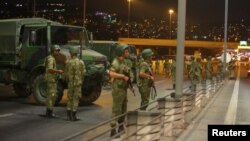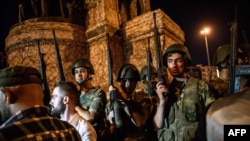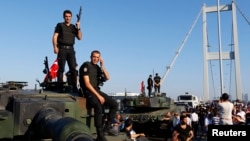The tanks started to roll seven hours earlier than planned Friday in Istanbul, with soldiers quickly blocking the famous Bosphorus Bridge with the aim of preventing cars and pedestrians crossing from the Islamist-leaning Asian side to the European side of the city, according to sources.
The coup plotters reckoned, correctly as it turned out, any civilian resistance to their efforts to overthrow the government would come mainly from the Asian side of Istanbul, the half of the city that has turned out in large numbers in recent elections to back President Recep Tayyip Erdogan and his Islamist-aligned Justice and Development Party.
Other bridges, too, were occupied. Social media platforms started to sputter suffering outages, and then for an hour were blocked.
According to Turkish military officers who talked with VOA on condition of anonymity, Turkey’s fourth fully-fledged coup since 1960 started badly.
The plotters, among them allegedly Gen. Akin Ozturk, former commander of the Air Force, Gen. Adem Huduti, 2nd Army commander; and Lt. Gen. Erdal Ozturk, commander of the 3rd Corps in Istanbul, feared their plans had leaked. They moved forward the coup’s start time, which was meant to have begun at dawn Saturday.
Over in 12 hours
That change may explain the subsequent mis-timings and poor synchronization in Ankara and Istanbul as the plot unfolded, say military analysts. Unlike with Turkey’s previous coups, two of which had the backing of the top military brass including the chiefs of the general staff, last week’s unsuccessful putsch floundered quickly and was over in 12 hours.
Key targets, among them the intelligence headquarters in the Turkish capital, broadcasting studios, which President Erdogan used effectively to make appeals for public support via his cell phone and FaceTime, and the country’s parliament were attacked or occupied after considerable delays. Above all, the coup’s ringleaders failed to capture the Turkish president vacationing at a hotel an hour’s flight time from Istanbul in the resort town of Marmaris.
The sloppiness of the coup bid has prompted allegations, promoted widely on social media, the effort was staged by Erdogan and orchestrated to justify a crackdown on opponents. The Muslim cleric Fethullah Gulen, who Erdogan accuses of being behind the coup attempt, is among those leveling the charge.
Western diplomats based in Turkey, though, are dismissing the claim, saying such a plot would have little chance of going undetected and present too much risk for Erdogan. They point out one of his most trusted aides, Erol Olcak, along with his 16-year-old son, were shot dead on the Bosphorus Bridge protesting Friday's attempted coup.
“There are too many gaps in the storyline some of Erdogan’s staunchest foes would have us believe, no credible evidence has been offered, so far, and I can tell you the Erdogan aides I talked with Friday were panicked,” a European ambassador told VOA.
General’s role
What stands out to some military analysts is how the coup plotters failed to secure crucial installations quickly enough. Another key factor was the resoluteness in particular of one pro-Erdogan military commander, Gen. Umit Dundar, head of the 1st Army in Istanbul, who persuaded Erdogan to leave the Mediterranean resort of Marmaris and flee, not to Ankara, but Istanbul.
By the time the coup leaders sought to capture Erdogan, he had fled Marmaris and was landing in Istanbul after soldiers loyal to Dundar retook the control tower at Ataturk Airport.
On Friday, as the bridges started to be occupied, the coup’s leaders contacted Dundar, urging him to join them and threatening arrest, if he failed to comply. He hung up, contacted Istanbul’s police chiefs and then called Erdogan, say Turkish officials.
“The fate of the coup was determined by Gen. Umit Dundar,” argues Metin Gurcan, an independent security analyst and onetime adviser to the Turkish military. “Erdogan’s quick departure to Istanbul was one of the key elements disrupting the coup plans," according to Gurcan, a columnist for the Al Monitor news site.
Dundar wasn’t the only top-ranking general to defy the plotters, wasting valuable time for the coup’s leaders.
As the coup started to face serious obstacles in Istanbul with civilian supporters of the Turkish president taking to the streets, high drama played out in the country’s military headquarters in Ankara, where the chief of general staff, Gen. Hulusi Akar, was held at gunpoint and ordered by his private secretary to sign a coup declaration, saying the putsch was being undertaken ultimately to preserve democracy, not to undermine it.
Other commanders in the Ankara headquarters were taken hostage also, many by their own aides. Air force commander Abidin Unal was kidnapped by his bodyguards. According to local media reports, Akar’s aide, Maj. Gen. Mehmet Disli, attempted to cajole and then intimidate his boss, at one point allegedly by tightening a belt around his neck.
The defiance of the top branch commanders didn’t help the plotters persuade other units to join the putsch. Some wavered, seemingly waiting to see how the plot would fare.
That killed the coup, said Afzal Ashraf, an analyst at the Royal United Services Institute, a British-based think tank. “There was a naive and critical failure to appreciate the power of mobile communications, which enabled the president to speak to the nation using FaceTime via CNN,” he said. “Neither before nor after the coup was there a compelling political narrative from the leaders of the coup. In simple terms, the coup failed because it was planned as a military operation without an effective political plan.”


